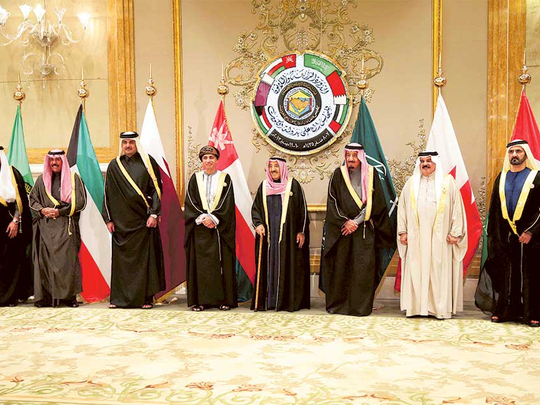
Dubai: Even before it opens today in Doha, the annual Gulf Cooperation Council summit can be considered a success. After months of political impasse between the six member states, the leaders of the UAE, Saudi Arabia, Oman, Kuwait and Bahrain meet in the Qatari capital at the time and place agreed last year — a gathering that comes three weeks after a brokered deal in Riyadh that set relations back on course.
Now, the GCC will focus on cementing relations mainly in the defence and military field, and discuss ways to combat Daesh and eliminate its threat. The summit is also expected to discuss support for Yemen and Egypt, analysts say.
“The most important thing is that the summit starts in the previously set time and place,” said UAE political scientist Abdul Khaleq Abdullah. “And this by itself — even if nothing else is achieved other than holding the summit with high-level delegations — will make a place for the summit in history,” he told Gulf News.
For months, Arab Gulf countries were in disagreement with Qatar who had angered partners in the council by its support of the Muslim Brotherhood in Egypt. Saudi Arabia, Bahrain and the UAE accused the group of attempting to destabilise their security, and they went as far as formally and legally denouncing the organisation as a terrorist group.
It was the worst diplomatic crisis in the history of the bloc that was established in 1981. The dispute lasted seven months, during which Riyadh, Manama and Abu Dhabi recalled their ambassadors to Doha. The diplomats returned after a reconciliation summit was held in Riyadh on November 15 thanks to Kuwaiti mediation.
“The importance of this summit is that it comes after a meeting in which all countries agreed on cooperation and act in what might be described as one state policy,” said Turki Al Sudairi, Editor-in-Chief of the Arabic-language Saudi newspaper Al Riyadh.
“There is a general concept of agreement among the member states of GCC to have a Gulf policy and not a policy of an individual country,” he told Gulf News.
And when they meet, the six leaders need to take a unified stand on several issues of importance to their countries, analysts said.
“I believe the issue of Daesh will form a big part of the agenda,” said Bahraini veteran analyst and former minister Ali Fakhrou.
“Daesh is an external danger and internal danger as well. It is not known how many sleeping cells there are [in the Gulf states], how many people do actually support it, and how many people do sympathise with Daesh. These are very big security issues,” Fakhrou told Gulf News.
The Gulf states will seek to boost their overall security as well, he added.
The current security situation in the region necessitates raising the level of security cooperation, Abdullah said.
“One of the most important things we are expecting from the summit is the agreement on a joint military command,” Abdullah said. “A Joint air force command and a joint naval force command are also on the table. “We are talking about a bloc that is similar to Nato.”
While some analysts expect an expression of support for Egypt to draw considerable attention, others believe the rapidly deteriorating situation in Yemen will also be a point of focus.
Yemen is becoming a “very dangerous issue” to the Gulf states and is expected also to be high on the agenda, Fakhrou said.
Other issues expected to be discussed include the situation in Syria and relations with Iran.
Falling oil prices and ways to defend their share of the international markets amid a shale oil boom are also expected to be discussed during the summit. A barrel of crude has lost 40 per cent of its value since June.











